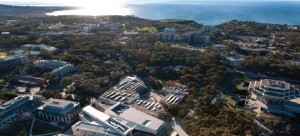
UCSD generates 92% of its own energy on an annual basis, utilizing its microgrid to integrate generation sources, while also acting as a test bed for new technologies.
Because UCSD is state property, it is not subject to local ordinances and permitting requirements. Since it is not a utility, it is not subject to regulation by the state Public Utilities Commission. The campus has its own fire marshal and safety inspectors. “We can save companies two years,” said Washom. “That is critical in getting from the lab to market.”
Like many college campuses, UCSD has a campus power plant, built in 1962, that provides district heating and cooling. Washom and his colleagues have used it as a starting point for developing a 21st-century microgrid. The campus is “highly instrumented,” with a master controller from San Diego-based Power Analytics integrated with an OSIsoft data server monitoring 84,000 data streams per second.
The result is an innovation incubator that is host to a range of new energy technologies. While the university owns the microgrid system as a whole, many components are funded by grants or the vendors themselves. French solar company Soitec has provided two concentrating PV systems; ZBB Energy has installed a bank of zinc-bromide batteries; NRG is installing a fast EV charger; Maxwell Technologies will install a 28-kilowatt/15-minute supercapacitor; and BMW and RWE are testing a project to repurpose electric car batteries for grid storage.
“UCSD is a great place to showcase technology,” said Christopher Kuhl of ZBB Energy. “Our battery systems are intended to be in retail applications, so this was not quite in its intended setting. It shows what you can do with it, but doesn’t demonstrate commercial application.”
The microgrid itself might be a proof of concept, but it does power the campus of 45,000 people and 450 buildings. The system generates 92 percent of the campus’ electricity and 95 percent of the heating and cooling demand. Washom counts about $850,000 a month in savings compared to buying retail energy. (Green Tech Media)
Sources:
http://www.eenews.net/stories/1059996047
http://alumni.ucsd.edu/s/1170/emag/emag-interior-2-col.aspx?sid=1170&gid=1&pgid=4665
http://blog.rmi.org/the_ucsd_microgrid_showing_the_future_of_electricity_today
http://www.greentechmedia.com/articles/read/byrom-washom-master-of-the-microgrid